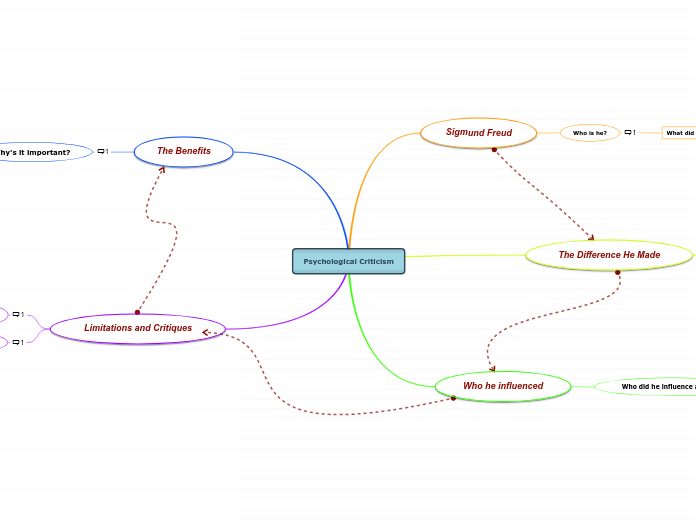作者:NA - 10ZZ 692550 Castlebrooke SS 4 年以前
336
Psychological Criticism

作者:NA - 10ZZ 692550 Castlebrooke SS 4 年以前
336

更多类似内容
Another critique in Freud's work is oversexsm. He uses objects in his writing to represent men and women and connects it back to sex which readers believe shows up one too many times throughout his stories. However, in his defense he explained that this wasn't always the case and that concave and convex items could just be what they say to be with no deeper meaning.
An issue with Freud's theory is sexism. For example, none of his discoveries and connections can relate to women such as the Oedipal theory. Freud himself admitted that female psychology was a dark continent for him in a 1926 essay. His challenge in understanding female psychology reflected in his literature which leads to wondering where women fit in Freud's world.
Psychology and literature are closely connected when it comes to human inquiry. Writers use psychological insights to create their art, and psychologists use this same art to further understand a human’s mind and find reasoning for their behaviour. The goal of the readers is to find why a certain character is acting a type of way. Psychological literature helps reveal underlying motivations of a literary character, author, or culture.
Norman N. Holland (also inspired by Sigmund Freud), explains how everyone reacts differently to pieces of literature. This is due to the fact that everyone has their own unique identity theme which they are seeking out. Books allow one to protect themselves mentally as well as their egos. Different forms of literature allow one to transform their dreams into a socially acceptable meaning.
In 1909, psychoanalyst Otto Rank, used Freud's theory in The Myth of the Bird of the Hero. He expanded on the Oedipus theory in which he explained the similarities between heroes and villains in popular literature and notices how all heroes have difficulty in their relationship with their fathers. He explains how the relationship goes from worship to disappointment to replacement.
His most famous piece of work was The Interpretation of Dreams (1900) of the ancient Greek play Oedipus Rex. This is when he formulated his theory of the Oedipus complex based on the stage play. He speaks about the changes young boys go through when the often feel a strong connection to their mothers and form a hatred for their fathers. He mentioned how those who manage to get through the phase still have these feelings locked away in their conscious due to the fact of them not being socially accepted.
One of his contributions was the idea that human behaviour is taken over by psychic forces when one has limited conscious control. He further explained how adults shy away from sharing their fictional realms due to society negligence and hide it away in one's conscious. This reality usually escapes in a form of a dream, slips of the tongue, or neurotic behaviour.
Sigmund Freud (1856-1939) was a physician in Austria and he focused on how the psyche works. He was working on a cure for mental illnesses which is also considered as the base of psychology now. He focused on: dreams, creativity, power, hysteria, neuroses, happiness and literature.
He developed concepts such as passive-aggressive behaviour and denial. Freud also created one of the most popular methods used to decipher a piece of literature. He linked creative writing to dreaming and fantasies and explains how this is the force behind writing.